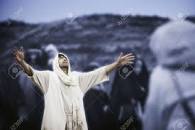"Sweet Hour of Prayer"
By
William Walford
The writer of this beloved hymn was blind, but he had a worth that is even felt in devotionals till the present today. As he stayed at home, sat beside the fire, he busied himself. He carved things from wood such as shoehorns and other objects. He maintained a very active as well as productive mind.
The Lord opened doors for him to preach from time to time in a rural English church. In his mind he would think through the sermons that he would deliver on the appropriate Sunday. He committed a great deal of the Bible to memory. Walford was also able to quote these lengthy passages out of his head. What a tremendous intellect he must have been Some believed that he had all the Bible in his mind. Similarly, he composed lines of verse as he thought and prayed.
One, Thomas Salmon of New York, spent time with Walford at his home in Warwickshire, England. He became a friend to him. He relates this story from memory of the blind pastor:
...He repeated two or three pieces which he had composed and having no friend at
home to commit them to paper, he had laid them up in the storehouse within. "How will
this do?" asked he, as he repeated the following lines, with a complacent smile touched
with some light lines of fear lest he subject himself to criticism. I rapidly copied the lines
with my pencil, as he uttered them, and sent them for insertion in the Observer, if you
should think them worthy of preservation."[1]
The periodical did indeed find the composition worthy. It was printed and published on September 13, 1845. “The rest,” they say, “is history.”
But for the fact that Salmon left a record that Walford was blind, we know little else of him.
“Sweet Hour of Prayer” has become a hymn as well as devotional classic. It has touched multitudes of lives wherever the English language has gone.[2]
It serves as reminder to us of Peter and the other disciples. They were to watch and pray with Jesus in the Garden of Gethsemane. He responds most pointedly:
“And he cometh unto the disciples, and findeth them asleep, and saith unto Peter, ‘What, could you not watch [pray] with me one hour?’” (Matt. 26: 40).
Sweet Hour of Prayer
Verse One:
Sweet hour of prayer! sweet hour of prayer! That calls me from a world of care, And bids me at my Father’s throne Make all my wants and wishes known. In seasons of distress and grief, My soul has often found relief And oft escaped the tempter’s snare By thy return, sweet hour of prayer!
Verse Two:
Sweet hour of prayer! sweet hour of prayer! The joys I feel, the bliss I share, Of those whose anxious spirits burn With strong desires for thy return! With such I hasten to the place
Where God my Savior shows His face, And gladly take my station there, And wait for thee, sweet hour of prayer!
Verse Three:
Sweet hour of prayer! sweet hour of prayer! Thy wings shall my petition bear To Him whose truth and faithfulness Engage the waiting soul to bless. And since He bids me seek His face, Believe His Word and trust His grace, I’ll cast on Him my every care, And wait for thee, sweet hour of prayer!
Verse Four:
Sweet hour of prayer! sweet hour of prayer! May I thy consolation share, Till, from Mount Pisgah’s lofty height, I view my home and take my flight: This robe of flesh I’ll drop and rise To seize the everlasting prize; And shout, while passing through the air,
“Farewell, farewell, sweet hour of prayer!”
Bibliography from Christianity.com article:
1. Brown, Theron and Butterworth, Hezekiah. The Story of the Hymns and Tunes. New York: George H. Doran, 1905.
2. "Sweet Hour of Prayer." http://www.cyberhymnal.org
3. Wells, Amos R. A Treasure of Hymns; Brief biographies of 120 leading hymn- writers and Their best hymns. Boston: W. A. Wilde company, 1945.










Comentários